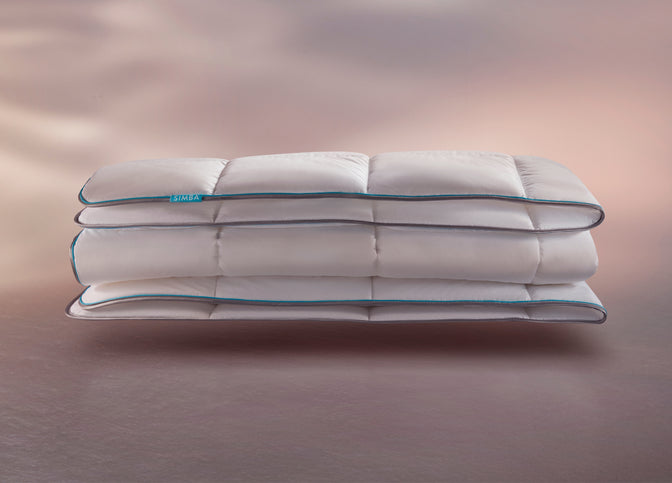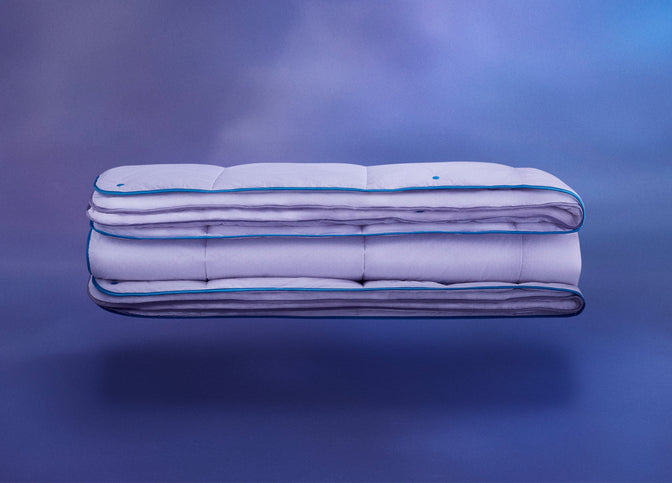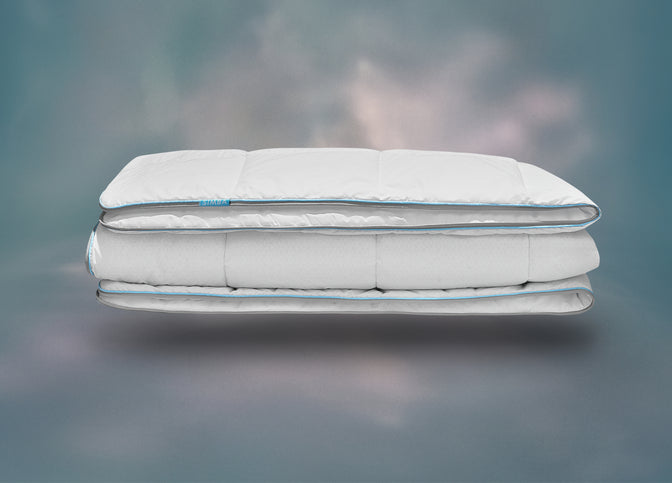The Ultimate Duvet Buying Guide

For years we've been told that we should choose a duvet according to tog rating, which means keeping winter and summer duvets in the loft, ready to swap as the seasons change. Luckily, in today’s world, there’s a far easier (and more comfortable) way to sleep, and that’s by choosing a duvet that’s designed to keep you at the perfect temperature all your round.
Still not sure? This is our ultimate guide to choosing the duvet that’s right for you.
What is a tog rating?
'Tog' is actually an acronym; it stands for 'Thermal Overall Grade'. The rating doesn’t just apply to duvets; it’s used all over the textile industry, including in things like carpet underlay. For duvets, it's a measure of how much insulation they provide. So, in short, the higher the tog rating, the warmer the duvet.
You'll often see this described as summer weight (usually 3 - 4.5 tog), spring and autumn weight (7.5 - 10.5 tog) and super-insulating winter weight (12 - 13.5 tog). Most duvets you buy on the high street will have the tog rating written on the front, and it’s used as a catch-all to help you choose the right duvet for the season.
Are tog ratings important?
Here’s the thing - there’s far more to choosing a great duvet than looking at its tog rating.
If you’re looking for a warm duvet that keeps you toasty in winter, you may be tempted to look for one that has the highest rating possible. But its high tog rating could be offset by material that actually makes you sweat more, a poor quality filling that makes you feel too stuffy, or an uncomfortable amount of weight. The same goes for summer duvets: a low tog rating sounds great, but will it actually be comfortable to sleep under?
When you’re shopping on the high street, looking at the tog rating seems like the right place to start. However, if you have the option, it’s best to choose something that has been specifically designed to keep your body temperature even all year and uses high quality materials.
Do I need a different tog rating for winter and summer?
As we’ve mentioned it would be better to look for an all-season duvet , as it eliminates many of the problems caused by a blanket approach to warmth (pun intended).
If you do want to choose a different tog rating for summer and winter, prioritise high quality materials that help you regulate your body temperature. Think about different fillings as well - do you find natural or synthetic materials more comfortable?
The disadvantages of choosing a duvet by its tog rating
There are three main reasons why tog rating isn't that helpful in deciding which duvet to buy:
- Our houses are centrally heated (or even air conditioned). Our winter bedrooms are often warmer than our summer ones, thanks to us cranking up the heat. In general, to sleep better you need a cool core, which means keeping the thermostat at 17-19 degrees and making sure you're not sweltering under a heavy quilt. The tog rating of your duvet means very little if your bedroom is artificially cooled or warmed, as they usually are.
- Some duvets now pack advanced temperature regulating technology. For example, our Simba Hybrid® Duvet fill contains minerals that dissipate heat, and the outer fabric uses Stratos® technology. That's a phase change material that absorbs, stores and releases heat as you need it to.
- No two nights are the same. In the run-up to summer you might experience a few hot nights and switch to your summer duvet, only to find yourself freezing the next evening because the temperature has plummeted again. Choosing an all-season duvet means way less hassle in the long run (and you won’t need extra storage space, either).
Choosing a new duvet
There are a few simple things you can do to find your perfect duvet:
- Look for one that'll stop you overheating. You don't want to wake up because you're too warm.
- Check out the filling. Feather and down sound super luxurious, but they are a common allergen, even for people who don’t usually experience allergies. A fibre filling might have hidden technology, like ours, which is also completely recycled and vegan-friendly.
- Choose breathable fabrics. A cotton cover is a good idea, especially if you can team it with sheets that allow air flow or have moisture-wicking properties. (Ours use a TENCEL blend).
Duvet fillings
Generally speaking, there are two types of duvet filling: natural and synthetic.
Natural fillings tend to be feather and/or down (traditionally from ducks or geese). These duvets are often heavy, and they used to be popular because they very effectively trapped heat - although this isn’t as necessary now that we commonly heat our homes. They aren’t vegan-friendly.
Synthetic fillings can be made from a range of non-animal derived materials. They often feel lighter (although this doesn’t mean they will be too cool), and they are designed to withstand more frequent washing. We use synthetic materials as they’re hardier, easier to care for, and are great for helping you regulate your body temperature at night.
Duvet thread count
Just like tog ratings, sticking the thread count on the front of a duvet (or duvet cover) is supposed to indicate its quality. It’s assumed that higher thread count means higher quality, but that isn’t necessarily true - it literally just shows how many threads there are in one square inch of the material. So you could have a duvet with a high thread count, but which uses low quality or non-sustainably sourced threads.
We don’t worry much about thread counts. Instead, the Simba Hybrid® Duvet uses high quality threads sourced via the Better Cotton Initiative. It's smooth, soft and breathable - just what you need during any night.
In short, don’t sweat the tog count - quality and design are your main priorities for finding a great duvet that keeps you warm in the winter and cool in the summer.
"Breathable, so keeps you cool in the warm weather and warm during cold nights. Paired with the mattress, it makes for a great night's sleep."-Nicola C, Hybrid™ Duvet
"A quality premium duvet that keeps you warm and cool when needed. It feels soft on the skin and keeps you snug at night, what a great investment."-Niall M, Hybrid™ Duvet



